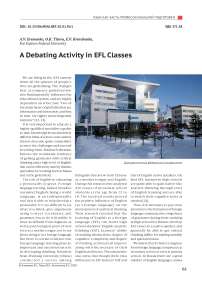Mobile application as an additional tool for developing lexical skills
Автор: V.V. Ryabkova
Журнал: Высшее образование сегодня @hetoday
Рубрика: Педагогика
Статья в выпуске: 12, 2019 года.
Бесплатный доступ
The paper regards the importance of formation and development of lexical skills as one of the key components of foreign language learning. Various tasks based on the mobile appli-cation platform Quizlet, that was created on the basis of fl ashcards method, are presented. The application (app) itself and its functions are examined. The results of the investigation that was carried out in the groups of adult learners, who study common and business English, are analyzed thoroughly. The example of the questionnaire that was offered to the learners after the experiment is given. The following conclusions based on the results of the investi-gation and questionnaire were drawn: the integration of the mobile application into tradi-tional learning process contributes to more effi cient target language vocabulary acquisition; the development of self-learning, lexical and mobile competences; the display of the interest in and of the attention to the foreign language on the learners’ part. It was also stressed that modern changes in the traditional foreign language learning are necessary, for example, the introduction of mobile technologies that leads to more profi cient level of English. The absence of the connection between the age and the interest in using mobile technologies is proved.
Vocabulary acquisition, active vocabulary, lexical competence, mobile competence, mobile devices, mobile application
Короткий адрес: https://sciup.org/148321177
IDR: 148321177 | УДК: 372.881.111.1 | DOI: 10.25586/RNU.HET.19.12.P.40
Список литературы Mobile application as an additional tool for developing lexical skills
- Бедретдинова И.А., Будник Е.А. Особенности обучения лексическому компоненту речи на различных этапах (на материале английского языка) // Статистика и Экономика. 2014. № 2. С. 9-12.
- Вепрева Т.Б. Лексика в обучении иностранным языкам // Вестник Северного (Арктического) федерального университета. Сер.: Гуманитарные и социальные науки. 2010. № 6. С. 104-107.
- Комарова Е.В. Трудности употребления иноязычной лексики в процессе обучения иностранному языку // Современные научные исследования и инновации. 2015. № 2. Ч. 4. URL: http://web.snauka.ru/issues/2015/02/47166 (дата обращения: 16.05.2019).
- Рогова Г.В., Рабинович Ф.М., Сахарова Т.Е. Методика обучения иностранным языкам в средней школе. М: Просвещение, 1991. 287 с.
- Соловова Е.Н. Методика обучения иностранным языкам: базовый курс лекций. М: Просвещение, 2005. 239 с.
- Common European Framework of Reference for Languages: Learning, Teaching, Assessment. URL: https://rm.coe.int/16802fc1bf (дата обращения: 15.05.2019).
- EUROCALL (European Association for Computer Assisted Language Learning). URL: http://www.eurocall-languages.org/sigs/mobile-assisted-language-learning-mall-sig-homepage (дата обращения: 17.05.2019).
- Godwin-Jones R. Using Mobile Devices In The Language Classroom: Part of the Cambridge papers in ELT series. Cambridge: Cambridge University Press. URL: https://www.cambridge.org/elt/blog/wp-content/uploads/2018/03/Whitepaper-mobilesinclass.pdf (дата обращения 07.06.2019).
- Krivoshlykova L., Pushkina A., Korovina S., Kovalyova I. Audiovisual Method In Teaching Adult Learners // ICERI 2018 Proceedings (11th annual International Conference of Education, Research and Innovation) 12-14 November, 2018. Seville, Spain. P. 8748-8754.
- Quizlet. URL: https://quizlet.com/en-gb (дата обращения: 20.05.2019).
- Sanosi Abdulaziz B. The Effect of Quizlet on Vocabulary Acquisition // Asian Journal of Education and e-Learning. 2018. Vol. 6, Issue 4. P. 71-77.
- Segev E. Mobile Learning: Improve Your English Anytime, Anywhere. URL: https://www.britishcouncil.org/voices-magazine/mobile-learning-improve-english-anytime-anywhere (дата обращения: 10.06.2019).
- Vocabulary Acquisition: Possibilities Within the Task-Based Framework https://gupea.ub.gu.se/bitstream/2077/39747/1/gupea_2077_39747_1.pdf (дата обращения: 05.06.2019).
- Wang G. Using Pedagogic Intervention to Cultivate Contextual Lexical Competence in L2: An investigation of Chinese EFL learners. Springer, 2018. P. 265.
- Wilden S. Mobile Learning. Oxford University Press, 2017. P. 104.
- Zimmermann C.B. Historical Trends in Second Language Vocabulary Acquisition / Second Language Vocabulary Acquisition: a Rationale for Pedagogy / Eds. L. Coady, T. Huckin. Cambridge university press. P. 5-18.


